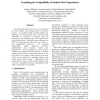Free Online Productivity Tools
i2Speak
i2Symbol
i2OCR
iTex2Img
iWeb2Print
iWeb2Shot
i2Type
iPdf2Split
iPdf2Merge
i2Bopomofo
i2Arabic
i2Style
i2Image
i2PDF
iLatex2Rtf
Sci2ools
110
click to vote
AGILEDC
2006
IEEE
2006
IEEE
Examining the Compatibility of Student Pair Programmers
Pair programming has been shown to be beneficial for both students and teaching staff in university courses. A two-phased study of 1350 students was conducted at North Carolina State University from 2002-2005 to determine if teaching staff can proactively form compatible pairs based upon any of the following factors: personality type, learning style, skill level, programming self esteem, work ethic, or time management preference. We examined compatibility among freshmen, advanced undergraduate and graduate student pair programmers. We have found that overall 93% of students are compatible with their partners. Students notably preferred to pair with a partner that he or she perceived to be of similar or higher skill level to them, which can be predicted by grouping students with similar grade point average. Additionally, pairs comprised of a sensor and an intuitor learning style seem to be compatible, and pairs with differing work ethic are generally not compatible.
| Added | 10 Jun 2010 |
| Updated | 10 Jun 2010 |
| Type | Conference |
| Year | 2006 |
| Where | AGILEDC |
| Authors | Laurie Williams, Lucas Layman, Jason Osborne, Neha Katira |
Comments (0)

